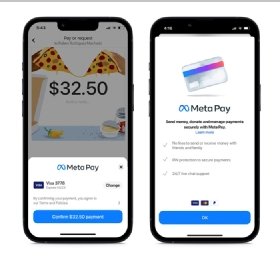
Getty Images
Meta intends to win metaverse wallet race with Meta Pay
Meta plans to let metaverse users pay for digital items, retain the proof of item ownership and manage their identities with the newly rebranded Meta Pay.
Meta, formerly Facebook, wants to monetize the metaverse by expanding the digital wallet capabilities available on the company's social networks.
This month, the company rebranded Facebook Pay as Meta Pay while continuing to offer the payment service for items on online stores and Facebook, Messenger, Instagram and WhatsApp. The service lets people make purchases without entering payment information each time. Meta Pay will do the same on the metaverse, speeding sales of digital items, art and tickets to virtual events, Meta CEO Mark Zuckerberg said.
"The more easily you can transact, the bigger the opportunity for creators," he said in a Facebook post.
Meta Pay could make the metaverse more attractive for retailers, as simplicity drives more consumer spending. A 2020 Marketing Science Institute study found that customers spent 17.4% more at retail sites after sellers adopted one-click buying. Conversely, 17% of consumers in a Statista survey abandoned their online orders because the checkout process was too complicated.
The immersive nature of the metaverse makes easy buying essential, OnConvergence analyst Tom Brannen said. Suppose customers interact with the metaverse on a virtual reality (VR) headset. In that case, they won't want to take it off to type in a credit card number.
"The logistics of our traditional systems of making a payment are going to have to be completely redone for that world," he said.

Meta wants to be the first to have a wallet in place when the metaverse economy kicks off, Brannen said. If the company does not have an easy way to pay for purchases in its virtual world, a competitor could spring up and reap the profits. EBay was slow in building a payment option for its auctions, so PayPal solved the problem and made millions. EBay bought PayPal for $1.5 billion after a failed attempt to compete with it.
Meta faces an uphill battle. Facebook Pay isn't as popular as PayPal and Venmo for buying items and sending payments online, said Martha Bennett, an analyst at Forrester Research. Apple has a widely used digital wallet, Apple Pay, and reportedly has metaverse plans of its own with a VR or augmented reality (AR) headset in the works.
"Facebook Pay lags way, way behind other payment mechanisms," Bennett said.
Meta's ambitions for Pay go beyond payments, Zuckerberg said. Customers could use the wallet to prove they own a virtual good and use it across metaverse platforms. Meta Pay could also help users confirm their identity in the metaverse. The company did not provide details about how these capabilities would work.
Last year, Meta spent $10 billion on its metaverse division, chasing a market Constellation Research estimates could hit $21.7 trillion by 2030. However, this spring, Meta announced that it would spend less on developing the metaverse in the face of lackluster revenue growth.
Meta's spending has given it a strong position in the VR/AR market. The company's Meta Quest 2 accounted for 80% of the AR and VR headsets sold worldwide in 2021, according to research firm IDC.
Mike Gleason is a reporter covering unified communications and collaboration tools. He previously covered communities in the MetroWest region of Massachusetts for the Milford Daily News, Walpole Times, Sharon Advocate and Medfield Press. He has also worked for newspapers in central Massachusetts and southwestern Vermont and served as a local editor for Patch. He can be found on Twitter at @MGleason_TT.







